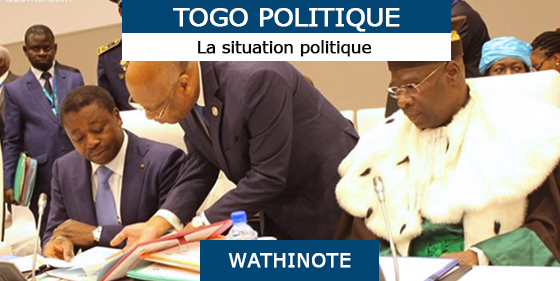Authors: Nelsy Affoum and Marie Dry
Site of publication: World Bank
Type of publication: Brief
Date of publication: September 2022
*Les Wathinotes sont des extraits de publications choisies par WATHI et conformes aux documents originaux. Les rapports utilisés pour l’élaboration des Wathinotes sont sélectionnés par WATHI compte tenu de leur pertinence par rapport au contexte du pays. Toutes les Wathinotes renvoient aux publications originales et intégrales qui ne sont pas hébergées par le site de WATHI, et sont destinées à promouvoir la lecture de ces documents, fruit du travail de recherche d’universitaires et d’experts.
The notion of equality for all Togolese nationals is embedded in the country’s 1992 Constitution, which states: “All human beings are equal in dignity and in right. The man and the woman are equal before the law. No one may be favored or disadvantaged for reason of their familial, ethnic, or regional origin, of their economic or social situation, of their political, religious, philosophical or other convictions” (Art. 2). Despite this clear constitutional guarantee to equality dating from the early 1990s, for more than a decade after the adoption of the constitution, Togo was slow to push forward women’s empowerment on the political agenda. However, in the early 2000s, once political will coalesced, in tandem with advocacy from local groups and the international community, Togo made tremendous improvements with respect to gender equality. Lately, women’s representation has also improved remarkably through the appointment of female leaders at strategic government positions. Notably, in January 2019, Mrs. Yawa Djigbodi Tségan was appointed president of the National Assembly and in September 2020, Mrs. Victoire Sidémého Tomegah Dogbé was appointed prime minister.
Togo is cited as one of the five most-improved countries in the World Economic Forum’s 2021 Global Gender Gap Report in its overall index, having narrowed the gender gap by 6.8 percentage points since 2020
This means that in one year, Togo has made progress toward closing gender-based gaps in economic participation and opportunity, educational attainment, health and survival, and political empowerment (World Economic Forum 2021). However, more work is needed in Togo to achieve full gender equality. Togo still ranks 91st out of 146 countries in the Global Gender Gap 2022 Report (World Economic Forum 2022). Further, the Women, Business and the Law 2022 report recorded a negative reform for Togo in 2021 with the enactment of a new Labor Code that no longer broadly prohibits the dismissal of pregnant workers (World Bank Group 2022). This step backward demonstrates that progress remains tenuous, and that setbacks are possible.
Controversies concerning inheritance rights and the head of household
During the debates on the reforms of the Persons and Family Code, controversies arose. The proposed changes to inheritance rules, previously governed by customary law excluding women and orphans from receiving any property, led to heated debates.
The number of seats held by women in the National Assembly has nearly doubled since the 2007 elections, from 9 women (representing 11.1 percent of elected members) to 17 women (representing 18.7 percent of total members) after the 2018 elections (IPU—Parline Global Data on National Parliaments)
The proposal of co-management of the household by both spouses also sparked additional discussions and a second round of reform was necessary to pass the amendment. This disposition was heavily debated and remains difficult to implement. As a CSO representative commented: “It is not yet integrated in the daily life of Togolese women. Legally speaking, when you go to the civil status office to get married, these provisions will be read and explained to you, but in the daily life of women it is not a reality.”
Gender equality reforms sparked other changes
As a result of the government’s willingness to promote women’s rights in Togo and more gender-equal legislation, other initiatives have focused on women in the economic and political spheres and have resulted in positive outcomes for women.
At the national level, the Support Fund for Youth Economic Initiatives (FAIEJ), created in 2006 and made fully operational in 2013, and the National Fund for Inclusive Finance (FNFI), initiated by the Ministry of Grassroots Development, Crafts, Youth and Youth Employment in 2014, support women entrepreneurs in their economic activity. Between 2014 and 2020, the share of women business owners grew from 22 percent to 32 percent (World Bank, Entrepreneurship Database). Further, women’s access to financial institutions or mobile-money services increased significantly, from 15.1 percent to 37.6 percent, between 2014 and 2017, although the gender gap persists (World Bank, Global Financial Inclusion Database, Findex).
National policies now strive to integrate a gender lens and increase women’s representation, notably in politics. A growing number of women have occupied high-level government positions, including in the Prime Minister’s Oce, the National Assembly, and the Ministry of Defense.
The number of seats held by women in the National Assembly has nearly doubled since the 2007 elections, from 9 women (representing 11.1 percent of elected members) to 17 women (representing 18.7 percent of total members) after the 2018 elections (IPU—Parline Global Data on National Parliaments).
Advocacy to challenge gender roles
Awareness raising in the public is an efficient way to challenge entrenched gender roles. The Groupe de réflexion et d’action Femme, Démocratie et Développement (GF2D), for instance, is a civil society organization working to improve gender equality and strengthen the rights of women and girls throughout Togo. Its work focuses on dismantling rigid gender norms that perpetuate gender inequalities, notably through awareness-raising campaigns. In addition to advocacy campaigns, a study conducted in the Democratic Republic of Congo presents evidence that holding gender norms discussion groups with couples can increase the share of domestic tasks and childcare that men take on.


Commenter